

Tao Te Ching
Search Sages
Enter all or part of an sage's name or biography in the fields below, then press tab or enter to filter the list of Authors. Click the headings Name or Biography to sort by that column. Diacritics are ignored when searching.
Click on the author's name to go to their page.
| Author Name | Biography |
|---|---|
| Dilgo Khyentse Rinpoche | 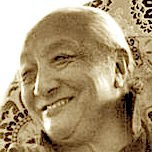 Dilgo Khyentse Rinpoche Dilgo Khyentse Rinpoche"Mind" incarnation of Jamyang Khyentse Wangpo Vajrayana master, poet, terton, scholar, and head of the one of Tibet’s main traditions; Khyentse Rinpoche became a major resource and driving force during Tibetan Buddhism’s transition out its 1000 years of isolation into the rest of the world. A descendent of Tibet’s legendary king, Trisong Detsen and a political minister father; he began an intense meditation practice and religious philosophy training when only 7 years old and then spent 13 years in caves and remote hermitages doing solitary retreats. An “archetype of spiritual teacher” and root teacher to hundreds of Tibet’s young lamas and to most of Tibet’s important modern teachers including Chogyam Trungpa, Dzongsqr Khyentse, the Dalai Lama, and Pema Chödrön; Khyentse Rinpoche’s wisdom and compassion continues to spread throughout the world. |
| Diogenes | 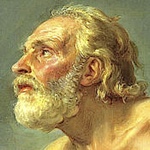 Diogenes DiogenesExiled from his place of birth, Diogenes lived as a citizen of the world begging for food and sleeping in a big ceramic jar. Carrying a lamp during the day “looking for an honest man,” he publicly ridiculed Alexander the Great, sabotaged and embarrassed Plato, and was sold into slavery after being captured by pirates. He developed Cynicism and teachings that became Stoicism, one of the most influential philosophies of Greek culture. He criticized the artificialities of society and advocated simplicity and a return to nature. Referencing him in their works, he inspired many great literary figures including Chekhov, Blake, Goethe, Dostoevsky, Cervantes, Charlotte Brontë and Charles Dickens. Called by Plato ”Socrates gone mad,” his poetic spirit and lifestyle continued through the ages, manifested in modern times by people like Charles Bukowski, and embodied in stories like Jack Kerouac’s On the Road. |
| Diogenes of Oenoanda | 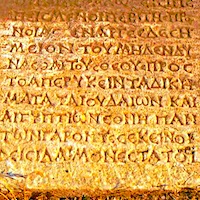 Diogenes of Oenoanda Diogenes of OenoandaGreat Preserver of Epicureanism Not much is known about Diogenes' life other than that he had a summary of Epicurus' philosophy carved onto a 2.37 x 80 meter wall. Originally taking up 260 square meters of wall space and including c. 25,000 words, now only about a third of it remains. That was enough though however to preserve a good sense of Epicurus' teaching on ethics, physics, and other fields. A close disciple, Diogenes felt that these teachings helped him immensely and he wanted to assure their survival and the ease for as many as possible to read them. |
| Disraeli, Benjamin | 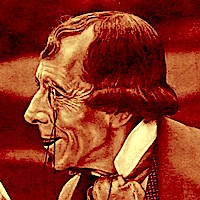 Disraeli, Benjamin Disraeli, BenjaminPolitical balance between mob rule and tyranny Highly accomplished two-time UK Prime Minister (and only one ever born Jewish), active novelist, poet, close friend of Queen Victoria, and one of the most influential European statesman; Disraeli led a complex and difficult to categorize life. Many saw him as an eloquent charlatan; many as a strong, capable, and patriotic leader. Countering the status quo attitude toward Jews as being inferior, he redefined Judaism as race rather than religion and described Jews as superior in talent and influence. This ironically, may have led to the later fear and resentment toward Jews that culminated in programs and concentration camps. A founder of the modern Conservative party, he brought an isolationist Britain into collaboration with Europe. After the failed Indian Mutiny of 1857 (caused by pig and cow greased bullets) and the annexation of India to Britain, he proclaimed Queen Victoria “Empress of India.” Although he promoted a kind of paternalistic monarchy and imperialism, his voice remains relevant in the ever-challenging balance between overly democratic mob rule on one side and autocratic tyranny on the other. |
| Dōgen Zenji |  Dōgen Zenji Dōgen ZenjiIllegitimate son of a Japanese noble, Dōgen became a famous poet, writer, philosopher, and founder of the Sōtō school of Zen. Dissatisfied with the spiritual materialism of Buddhist teaching and teachers in Japan, he traveled to China seeking a more authentic Way. After training there for many years he returned, taught a meditation practice called zazen, and wrote the first Japanese monastic code. His deep understanding and powerful use of language helped bring realization to many and continues today. |
| Dolores Huerta | 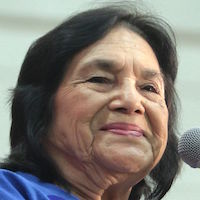 Dolores Huerta Dolores HuertaChampion for workers', immigrants', and women's rights; labor leader and civil rights activist; co-founder of an organization that became the United Farm Workers (UFW); Huerta was the first Latina inducted into the Women's Hall of Fame and received both the Eleanor Roosevelt Award for Human Rights and the Presidential Medal of Freedom. In 1988 her severe beating (necessitating spleen removal in emergency surgery) by police during a peaceful protest was caught on videotape and resulted in change SFPD crowd control policies and a huge settlement that she used to benefit farm workers.A frequent subject for murals, ballads, and the names of schools; she was on stage with Robert Kennedy just before his assassination, in 2008 formally placed Hillary Clinton's name into nomination, and was honorary co-chair of the 2017 Women's March on Washington. Though almost 90, she continues to work through her foundation on health, environment, education, and economic development. (picture at age 86) |
| Dölpopa Shérap Gyeltsen | 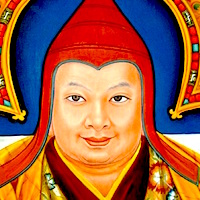 Dölpopa Shérap Gyeltsen Dölpopa Shérap GyeltsenA teen-aged run-away on-the-road spiritual seeker; Dolpopa became one the most influential Tibetan teachers, one of the most original thinkers in all of Tibetan history, one of the greatest experts on the Shambhala Kalacakra teachings, and a figure so controversial he is still inspiring debate 700 years later. It’s said that when followers of the traditional lineages heard these teachings, they “experienced seizures and scrambled brains.” He described a True Self, a Buddha nature, a "Diamond Self,” an unconditioned, living truth and presence within all of us. He agreed with the traditional teaching that absolute and relative are both empty but taught that they are empty in different ways, the relative empty of self-nature; the absolute empty of other but not empty itself (the Zhentong view). His Jonang tradition was violently suppressed by the Tibetan government during the 17th century, banned by Gelug authorities, and attacked in an attempt to wipe it out by the Fifth Dalai Lama. It survived however as a powerful influence on all of Tibetan Buddhism and crucial to the 19th century Rimé (རིས་མེད) movement. |
| Dombipa | 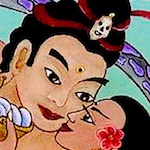 Dombipa DombipaEnlightened ruler of Magadha (Kashmir), Dombipa treated all his subjects like a “father would treat his only child” but his country suffered almost endless war, crime, famine, and poverty. He brought back prosperity, peace, and health but when he took a low caste “untouchable” as consort and started drinking large amounts of alcohol, the shocked people forced his abdication. After 12 years when the country’s problems returned, they begged him to return which he did “riding on a pregnant tiger” with his consort. To rule them again, he asked that they abandon the caste system. When they refused he went back into his meditation saying, “My only kingdom is the kingdom of truth.” This lineage continues with the Trungpa Tulkus. |
| Don José Matsuwa | 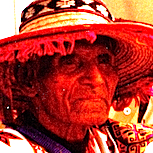 Don José Matsuwa Don José MatsuwaWounded healer, farmer, Huichol shaman, master ceremonial leader, window into our mysteriously inter-related and sacred world; Don José Matsuwa devoted his life to completing the sacred path of the shaman, to healing as a way of life and an art form restoring both individual and planetary balance. An important influence on Joan Halifax, she said, “I loved this old man. He was very funny, wise and crazy.” He visited Northern California and inspired the Dance of the Deer Foundation and the “Planetary Dance” that since 1980 has been performed each year and now in dozens of countries. |
| Donald Trump | 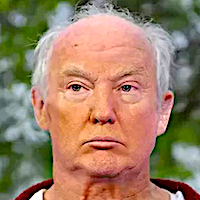 Donald Trump Donald TrumpWorst President in U.S. History Arguably the worst president in U.S. history, Trump is leaving behind as his legacy thousands of lies, scores of illegal and corrupt actions, and a country and world much worse than when he took office. The epitome of ego-centrism, arrogance, and corruption; he's undermined the rule of law, the constitution, and basic decency. An extreme racist, homophobe, and male chauvinist; it's hard to imagine someone who has sold more of their soul to the devils of materialism. But in spite of so much degradation, he maintained a serious and substantial number of followers. Why? Could it be because in times of turbulent change, people who don't think for themselves desperately want someone to tell them what to do and easily mistake bombastic arrogance for true confidence? |
| Dongshan Liangjie |  Dongshan Liangjie Dongshan LiangjieFamous poet, Shaolin Monastery Chan monk, founder of the Caodon school which became the Sōtō Zen lineage when taken to Japan in the 13th century by Dōgen; Dongshan helped develop the koan tradition. Drawing from the I Ching, inspired by the Sandokai, and inspiring the Oxherding Pictures, his famous poem Five Ranks described the path and unification of absolute and relative realities, the highest spiritual realization in the middle of everyday life. |
| Douglas Kerr | 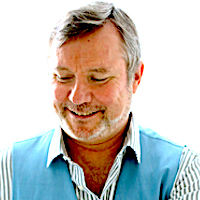 Douglas Kerr Douglas KerrProfessor, Hong Kong University |
| Douglas LePan |  Douglas LePan Douglas LePan |
| Du Erwei | 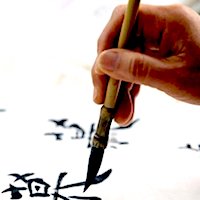 Du Erwei Du ErweiModern Chinese scholar |
| Du Fu 杜甫 | 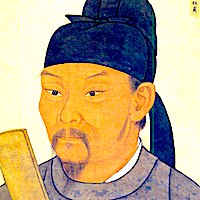 Du Fu 杜甫 Du Fu 杜甫 Though Li Bai in the West is most often considered China's greatest poet, in the East, that honor most often falls to Du Fu, "the Chinese Shakespeare." Historian, sage, and compared to Milton, Burns, and Wordsworth; Du Fu failed the Chinese examinations for public office although the subject was poetry but became one of China's most influential writers. A close friend and traveling companion of Li Bai during a time of intense political change, his fortunes rose and fell from the highest honors to the depths of misery finally to be robbed of the straw in his bed while he was too weak to resist. In Japan considered the "Saint of Poetry" and the major influence on the greatest haiku poet, Matsuo Bashō; Du Fu excelled at reconciling opposites, considered "everything in this world is poetry," and became one of the greatest writers in any language. |
| Duanmu Ci | 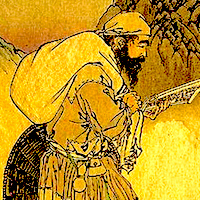 Duanmu Ci Duanmu CiConfucius’ most important disciple Third of the Twelve Confucian Wise Ones, successful and wealthy businessman, diplomat, and most important of Confucius’ disciples; Duanmu Ci became one of the most accomplished Confucian speakers and the one most mention in the Analects. His accomplishments however led to an arrogance that Confucius criticized along with his lack of empathy and harshness. When he claimed achieving the Confucian ideal, the Master dismissed him from his posts. Confucius later gave him the task of saving their state of Lu from the more powerful army of Qi that was preparing to attack and take over. His strategy and diplomacy saved Lu, significantly change the history of 5 states, and much of that time’s Chinese history. His memorial tablet is traditionally placed on the east side of Confucian temples. |
| Duke Wen of Jin | 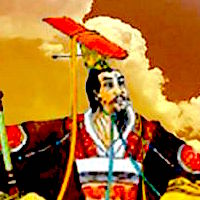 Duke Wen of Jin Duke Wen of JinInnovative political reformer A ruler during the Spring and Autumn period of ancient China who, after a 19-year period of exile declined the throne and passed it on to his half-brother; Duke Wen’s civil and military reforms created a highly successful, expanding, and stable government that lasted long beyond his life. According to Confucius, he was “crafty but not correct while Duke Huan was correct but not crafty.” |
| Dukhandhi | 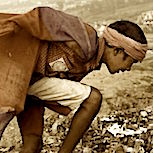 Dukhandhi DukhandhiMahasiddha #25 A low caste sweeper surviving by scavengering thrown-away pieces of cloth and making them into clothes, Dukhandhi - whose name means “he who unites duality” - thought he was prevented from good meditation practice by his need to survive by constantly sewing. His teacher pointed out how he could actualize the meaning of his name by uniting his necessary life experience with his spiritual path, that they are no different. After many years of stitching together spiritual practice with his daily life experience, he became enlightened and a great teacher. Mahasiddha #25 |
| Dwight D. Eisenhower | 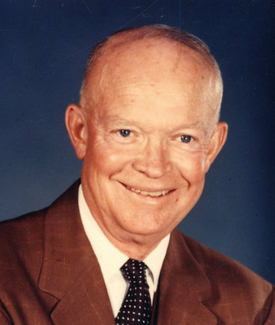 Dwight D. Eisenhower Dwight D. Eisenhower |
| Dwight Garner |  Dwight Garner Dwight GarnerAmerican Journalist |